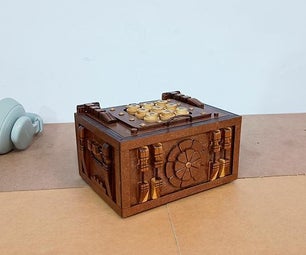Introduction: Beginner's Guide to Rainbow Six Siege
As somebody who's been playing Rainbow Six Siege for about two years now, I've found it to be one of the most unique first person shooter experiences on the market. More grounded and tactical than any shooter I've played, I've spent countless hours trying to master techniques in this phenomenon of a game.
However, when I first started playing, I found one thing to be true: because of how different it was, it was very hard to get a hold of the basics of the game. From the game modes to the destructibility of the environment, to all of the different maps and operators, it was a lot to take in in a very short period of time. In this guide, I'll give my best tips that any Siege player should know going into the game for the first time, to make their transition into the game quicker and far more enjoyable.
(Note: This guide will focus on Multiplayer game modes (player vs player), not Terrorist Hunt (player vs enemy). However, many of the tips I'll give will apply to Terrorist Hunt as well.)
Step 1: Part 1: Gameplay
The most important part of any game, regardless of genre, is its gameplay. With this considered, I figured it'd be a great place to start. In this section, I'll cover how crucial aiming for the head is (even more so than in other shooters), destruction mechanics and how to use them to your advantage, the different types of game modes, and what happens if you do lose all of your health, and aren't quite dead yet.
Step 2: 1.1: Always Aim for the Head
In Rainbow Six Siege, you can end any firefight instantly by shooting an opponent in the head. Any gun at any distance, through any number of obstacles, will always be an instant kill. Therefore, why not aim for the head every single time?
You might think that it's hard to aim for the head; guns recoil upwards, and the torso is the largest target on an opponent, so why not just aim there? Headshots can be worth the risk. You don't risk downing an opponent (see part 1.4), you can avoid any return fire, and most of all, it's just oh so satisfying to see that bullseye pop up in the kill feed. Here are my tips to get more headshots:
First, aim your shots a little bit longer. Especially at lower levels, people don't have incredible reaction times. If you spend that extra half a second adjusting your sights to be on the opponent's head, they aren't running away, and they aren't going to shoot back at you.
Second, if you can't take that extra time, aim for the neck/upper torso. Your gun's recoil will most likely make your sights move upwards, and in turn, into the enemy's head, making a headshot an inevitable outcome.
Step 3: 1.2: What's Destructible, and What Isn't?
One of the most unique aspects of Rainbow Six Siege is just how much of the maps can be destroyed; we're not talking one-time events like in Battlefield, we're talking almost every wall, every ceiling, every floor, everything. As such, it's important to know just what is destructible, and what isn't.
Most walls are "soft," or can be shot through; after shooting them enough, you'll make a hole you can see through. These walls can be reinforced by defenders, making them "hard" surfaces. These can still be broken, but only by the abilities of a select few operators.
Some walls are permanently hard; surfaces like concrete and stone cannot be broken through, so you can take solace in knowing that if you're next to a hard wall, you won't be shot through it.
Floors and ceilings are semi-hard; you can create sight lines by destroying the materials making them up, but steel bars will keep anybody from going through them. Only hatches can be completely broken open, and like walls, can be reinforced by defenders.
If you keep these tiers of destructibility in mind, you'll be taking advantage Siege's mechanics like a pro in no time.
Step 4: 1.3: Game Modes
There are three game modes in Rainbow Six Siege: Secure Area, Bomb, and Hostage.
Secure is the simplest of the three; stand in the designated area with no enemy interference for an allotted amount of time, and victory is yours. No real bells or whistles here, just make your way to the area, taking down any opponents in your path; conversely, if you're defending, keep opponents out of the area.
Hostage is similar to Secure, but instead of taking an area, you have to get to a hostage, then escort them outside of the building safely. The biggest tip I can give for Hostage is to, well, not shoot the hostage. If one team kills the hostage, that team loses. Additionally, if you pick up the hostage as an attacker, you will be reduced to only wielding your secondary weapon, meaning you can only use a pistol to defend yourself. As soon as you pick up the hostage, bolt for an exit.
Bomb, unlike either of the other game modes, has two objective rooms, bombs A and B. One attacker is given a defuser, which they must plant at one of the bomb sites, and then protect while it defuses; defenders must either keep the attackers from planting, or destroy the defuser by walking up to it and holding a button prompt. As an attacker, I recommend placing the defuser in doorways or windows, where you can clearly see it from a safe distance, so that you can watch for defenders. For defenders, watch if an enemy drops the defuser when you down them, as the attackers need to pick it up to win the round. If an enemy drops it, stay near it. Additionally, if you must destroy the defuser, I recommend trying to eliminate all enemies to be sure defusing won't be a near-guaranteed death.
Step 5: 1.4: Downing and Reviving
If you don't get headshot, it's likely that you will get downed upon losing all of your health. In this state, you will be able to scoot around slowly, unable to shoot. However, you aren't dead yet.
One of your teammates can come up to you and revive you, bringing you back into the fight with half of your original health. This gives you a second lease on life, potentially even eliminating the opponent who shot you. However, there is a catch: after you've been downed once in a round, you can't be downed again. That means if you drop to zero health again, you will be dead. No more chances.
In addition, you aren't invulnerable when you're downed; rather, you are more of a target than ever. One hit, and you're completely dead, so try to stay out of sight lines if you get downed, which will not only keep opponents from shooting you, but keep them from shooting anybody who comes to revive you.
Step 6: Part 2: Maps!
Now that you know the basics, let's get down to the battlegrounds you'll be duking it out in. The maps in Rainbow Six Siege all have different layouts, and I'm not going to cover all of them here, but I am able to give you some key info that pertains to every map in the game, regardless of which one you're on, or even which game mode you're playing.
Step 7: 2.1: Know Your Objective Rooms
Each map in Rainbow Six Siege has four or five objective rooms to choose from, spread across the different floors. Whenever you play a map, make note of where the objective room is: floor, name of the room (it's displayed on the bottom-left corner of your screen), etc. Knowing this in advance makes it much easier to find the objectives during the preparation phase on attack, and easier to set up when you're on defense. Most of all, on attack, it allows you to spend more time setting up your drone.
Step 8: 2.2: Cameras and Droning
Speaking of drones, let's talk about intelligence, and how cameras and drones play into it. Cameras are restricted to defending teams, and drones are restricted to attacking teams; while cameras can be accessed by the attacking operator Dokkaebi and the defending operator Echo has his own special drone, for the most part, this is always true.
Both serve the same purpose: to gather intelligence. By holding a button prompt, you can scan the visible area for enemies, which if you do, it will tell you the enemy's identity, and a real-time location, giving you a massive edge on the competition. Of course, this isn't without its counter on attack; to get rid of a camera, all you have to do is shoot it. In the pictures above, I've displayed the two ways a camera can appear: either on a massive pole outdoors, or on the ceiling indoors. Aside from specialized camera operators, you won't see anything other than these. Take out all the defenders' cameras, and you've crippled their intelligence.
Drones, on the other hand, are mobile and quick, but they only move if an operator is controlling it. There are small vents on the map that drones can fit into for quick escapes or entries. Like cameras, they can be shot out, so when you aren't piloting your drone, hide it somewhere the defenders won't find it. You also get a second drone on attack which you can use however you see fit, giving your team even more viewpoints to work with.
Step 9: Part 3: Be the Best Operator You Can Be
Of course, the lifeblood of Rainbow Six Siege is its diverse cast of operators. As of the latest major update, there are a total of 42 different operators to choose from, 21 each on attack and defense. To go through each and every one of them would be two things: one, it would be far too long to put in something like this. Two, it would take away from the joys of discovering what every operator does, and the best ways to use them. In this, I'll simply explain the basics of operators, and how to find the ones that are best for your play style.
Step 10: 3.1: Gadgets
Every operator comes with their own unique set of abilities, in the form of their gadget. For your convenience, I have decided to split the operators' gadgets into six categories, three on each side.
On Attack:
Damage Gadgets: Gadgets designed to inflict as much damage as possible on enemy defenders. Highlights include Fuze's cluster charge, where he shoots five grenades through a soft/semi-soft surface; Finka's nano boost, where she gives every operator on her team temporarily increased health, less recoil, and more speed; and Glaz's thermal scope, which allows him to highlight enemies in yellow and see through smoke.
Disruption Gadgets: Gadgets designed to disrupt the enemy team, whether by drawing attention or destroying gadgets. Gadget destroyers include IQ, Twitch, and Thatcher, while most other general disruptors have some kind of shield, like Blackbeard, Montagne, and Blitz.
Breaching Gadgets: Gadgets designed to breach walls. Examples include hard breachers like Thermite, Maverick, and Hibana, whose gadgets can destroy reinforced walls, and Sledge, Ash, and Buck, whose gadgets can more efficiently destroy soft surfaces than others.
On Defense:
Trap Gadgets: Gadgets that are traps, which go off upon enemies stepping into range. Some disorient, like Lesion and Ela, and some deal damage, like Frost and Kapkan.
Reinforcing Gadgets: Gadgets that further reinforce the objective or players. Objective reinforcers include Tachanka's turret and Castle's bulletproof barricades, and player reinforcers include Doc's stim pistol and Rook's armor plates.
Intel Gadgets: Gadgets that assist in gaining more intel, usually cameras. This includes camera gadgets belonging to Valkyrie, Maestro, and Echo, as well as other types of intel, like Mira's black mirror, which allows one-way sight, and Pulse, who can sense heartbeats through walls with his heartbeat detector.
Step 11: 3.2: Armor and Speed
Armor and speed widely determine how an operator is meant to be played. There are three different types of armor/speed designations: 3-armor 1-speed, 2-armor 2-speed, and 1-armor 3-speed. Most of the time, you'll be hearing to these designations referred to by what speed they are. In addition to being able to refer to swathes of operators in two words, these designations also tell you what kind of play is expected from them.
1-speeds, on defense, tend to anchor the objective, staying on or near the bombs/hostage/secure point to make sure anybody who gets near doesn't complete the objective. On attack, they tend to bring up the rear, or serve to cause distractions up front.
2-speeds are the most versatile, being able to either roam around the map or anchor on defense, and hang back or rush the objective on attack.
3-speeds on defense tend to roam the map, catching attackers off guard by attacking them from all angles, and are generally far from the objective unless the objective is attacked. On attack, they tend to rush the objective, getting in fast and striking the defense before they are completely prepared.
Learn what play style suits you, and figure out which operator of each speed is your favorite.
Step 12: Enjoy the Game.
Most of all, it's important that you have fun. Sure, it's cliché, but it's so unbelievably true. If you don't find Rainbow Six Siege enjoyable, then you don't have to play it. But if you do, play hard, play smart, and have a blast.







